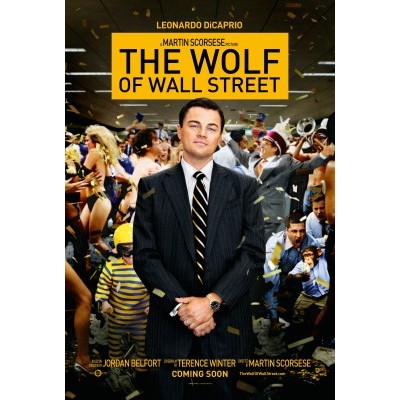
The Wolf of Wall Street isn't about Jordan Belfort. It's about you.
I can’t stop thinking about The Wolf of Wall Street. It baffles me. I am befuddled by it. How can a film about such abhorrent, loathsome, misogynistic, corrupt, slimy scum be occupying my consciousness so much? How did it manage to inspire such repulsion and such base attraction simultaneously? How is it that, despite its many, many flaws, it has proven to be so affecting?
As far as I can see, the only area of general agreement on
the film is that it is divisive. People walked out of my screening, though it’s
unclear as to whether this was down to boredom or revulsion. There seems to be
a fairly great consensus that, at 180 minutes, the film is groaningly,
back-breakingly, arse-achingly long. I think I looked at my watch 9 times.
Other than those areas, it has cleft critical opinion in twain.
The film follows the depraved debauchery of Jordan Belfort,
a Wall Street stockbroker who engaged in numerous illegal practices, including
stock-market manipulation and fraud, not to mention exploiting ordinary people,
to make millions and millions of dollars. He did all of this whilst taking a
large container ship’s volume in cocaine, Quaaludes and other illicit
substances, and copulating as if failure to exchange bodily fluids with every
last prostitute in America would bring grave dishonour upon his family.
Some have argued that the film has no moral centre; that the
crimes and antics of these baboons go utterly uncondemned by director Martin
Scorsese, and that there may even be some implicit endorsement of the
insobriety and infidelity, of the swearing and the swindling.
Total nonsense. What the film does is present a version of a
depressingly true story in all its gory glory, and allows it to affect you.
This is a masterstroke. You are presented with the American Dream – the greatest
myth ever sold – taken to its logical, most venal extent. Are you supposed to
be appalled? Absolutely, but are you not also a little bit seduced by it?
Perhaps, and that reaction in itself is interesting. It is the sort of film
which makes you laugh, but you’re not sure if you should be laughing. It is an
orgy of contradictions, literally.
The fact is that the film is not about Jordan Belfort – if it
were, it would be a dull and somewhat unengaging film (not to mention, FAR TOO
LONG). Rather, it is about you. The audient is not invited to sit in high
judgement over these puerile idiots, nor are you asked to think that these
people are somehow brilliant pioneers. Merely, you are faced with the facts of
this Dollar Gomorrah. How you react: ay, there’s the rub.
Having said that, one can justly say that the treatment of
women in this film is highly dubious. They are almost all sexual objects. Yes,
it is true that Belfort and his cronies viewed women in such a way, and it can’t
be said that the male gender is portrayed at all well in this film either, but
there is something uncomfortable about the crude sexualisation of women here.
Scorsese’s gamble of not having a moral tone in the piece is
that it leaves it open to almost wilful misinterpretation. We should not make
cinema with a mind to condescending to any perceived demographic, but I grew up
in an all-male boarding house, and we are dealing here with a teenage boy’s
fantasy made real – the story of how greedy, reptilian idiots won. In the
bedsits of public schools is where this film will be watched again, and again,
and again, and that is dangerous, for Wolf
reinforces all of the worst elements of the pubescent boy’s psyche. Then again,
Scorsese is not responsible for their education, nor should he be held up as
responsible for the moral development of a generation.
It is not that Wolf isn’t troubling. It is. Deeply. It left me feeling utterly
unclean, but it had challenged me in the process to think about how so very
different I am from these people I have so clearly judged. This is not, I think,
a mechanism for eliciting sympathy for them. The judgement of their actions is
correct, so it becomes a self-reflexive challenge. The final shot, of an
expectant but seemingly benign crowd, says it all. Ask yourself how different
you really are. The answer itself is interesting.
No comments:
Post a Comment